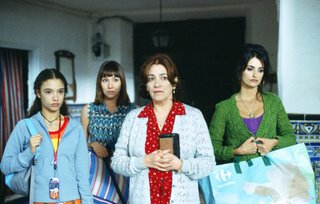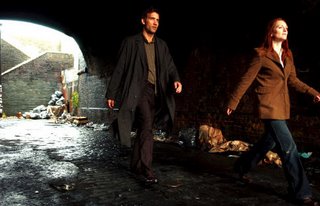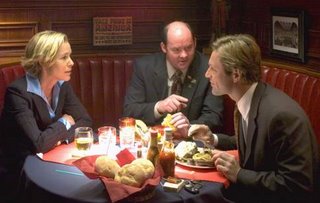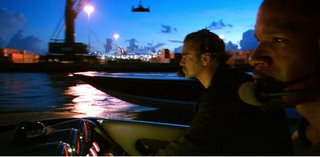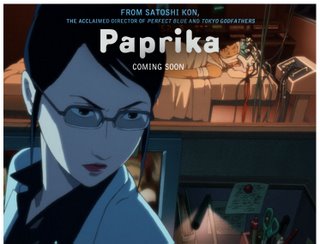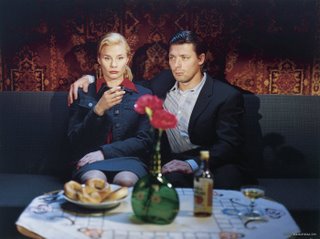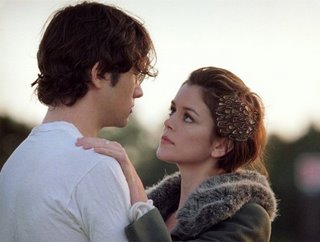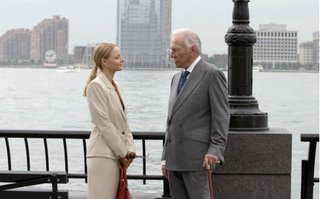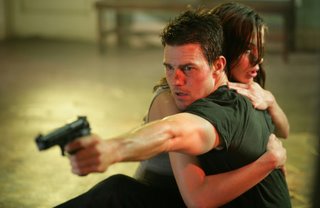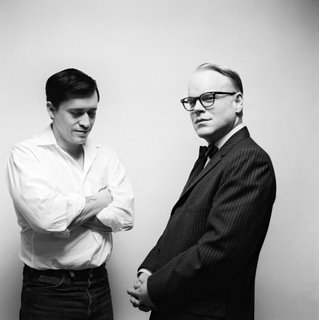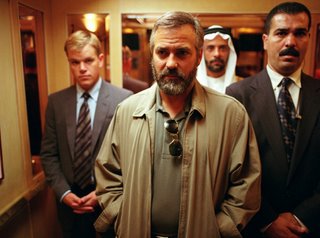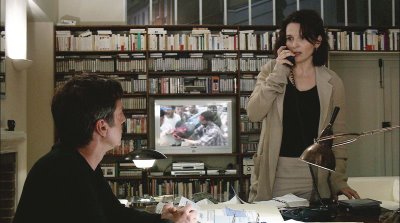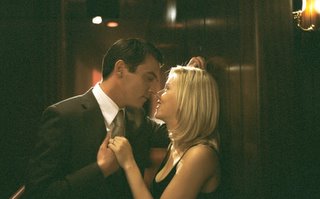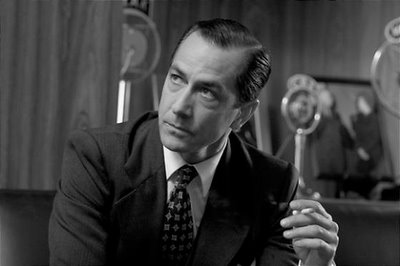
Oxford's Film guide has created the following list, according to the film critics, directors, producers and actors. Creating a catalogue of this kind is always something completely subjective. What are the criterria for choosing one film over the other? Historicity, personal liking, technological achievement, aesthetic, myths that accompany the making of the film? so many things influence our opinion! Anyway this list can only be indicative. You can not take it seriously. On the other hand is an ecxellent starter of heated conversation between cinemaniacs. So for Lukia who requested it and others who might be interested.....
1. Citizen Kane 111 points (Orson Welles, 1941, US)
2. The Godfather 101(Francis Ford Coppola, 1971/1974/1990, US)
3. La Regie du Jeu 77(Jean Renoir, 1939, Fr)
4. Vertigo 73(Alfred Hitchcock, 1958, US)
5. Seven Samurai 63(Akira Kurosawa, 1954, Jap)
6. Lawrence of Arabia GO(David Lean, 1962, GB)
7. Raging Bull 58(Martin Scorsese, 1980, US)
8. Touch of Evil 55(Orson Welles, 1958, US)
9. Tokyo Story 50(Yasujiro Ozu, 1953, Jap)
10. L'Atalante 49Gean Vigo, 1934, Fr)
11. The Night of the Hunter 47(Charles Laughton, 1955, US)
12. The Conformist 46(Bernardo Bertolucci, 1969, It/Fr/WGer)
13. Les Enfantsdu Paradis /.'(Marcel Carne, 1945, Fr)
— A Matter of Life and Death 41(Michael Powell/Emeric Pressburger, 1946, GB)
15. 8 1/2 (Federico Fellini, 1963, It)
— The Magnificent Ambersons 37(Orson Welles, 1942, US)
17. Apocalypse Now 36(Francis Ford Coppola, 1979, US)
— North by Northwest 36(Alfred Hitchcock, 1959, US)
19. Chinatown 32(Roman Polanski, 1974, US)
20. La Dolce Vita 31(Federico Fellini, 1960, Fr/It)
— The Searchers 31(John Ford, 1956, US)
22. The Wild Bunch 30(Sam Peckinpah, 1969, US)
23. The Life and Death of Colonel Blimp 29(Michael Powell/Emeric Pressburger, 1943, GB)
— Some Like It Hot 29 (Billy Wilder, 1959, US)
— Taxi Driver 29 (Martin Scorsese, 1976, US)
26. Napoleon 28(Abel Gance, 1927, Fr)
— Rear Window 28(Alfred Hitchcock, 1954. US)
28. Battleship Potemkin 26(Sergei Eisenstein, 1925, USSR)
— It's a Wonderful Life 26(Frank Capra, 1946, US)
— Performance 26(Nicolas Roeg/Donald Cammell, 1970, GB)
31. The General 25(Buster Keaton/Clyde Bruckman, 1926, US)
32. A Bout de Souffle 24Qean-Luc Godard, 1959, Fr)
— Mean Streets 24 (Martin Scorsese, 1973, US)
— Once Upon a Time in the West 24(Sergio Leone, 1968, It)
— Rio Bravo 24 (Howard Hawks, 1959, US)
36. Once Upon a Time in America 23(Sergio Leone, 1983, US)
37. All About Eve 22Ooseph L Mankiewicz, 1950, US)
— My Darling Clementine 22 (John Ford, 1946, US)
— 2001: A Space Odyssey 22(Stanley Kubrick, 1968, GB)
40. The Piano 21(Jane Campion, 1993, Aust)
— Pierrot le Fou 21Gean-Luc Godard, 1965, Fr/It)
42. Bringing Up Baby 20(Howard Hawks, 1938, US)
— The 400 Blows 20 (Francois Truffaut, 1959, Fr)
— Gone With the Wind 20 (Victor Fleming, 1939, US)
— The Lady Eve 20 (Preston Sturges, 1941, US)
— L'Annee Derniere a Marienbad 20(Alain Resnais, 1961, Fr)
— Letter from an Unknown Woman 20(Max Ophuls, 1948, US)
48. The Battle of Algiers 19(Gillo Pontecorvo, 1965, Alg/It)
49. The Gold Rush 18(Charles Chaplin, 1925, US)
— La Grande Illusion 18 Oean Renoir, 1937, Fr)
— Une Partie de Campagne 18 Gean Renoir, 1936, Fr)
— The Philadelphia Story 18 (George Cukor, 1940, US)
— Pickpocket 18 (Robert Bresson, 1959, Fr)
— Schindler's List 18 (Steven Spielberg, 1993, US)
— The Shining 18 (Stanley Kubrick, 1980, GB)
— The Third Man 18 (Carol Reed, 1949, GB)
57. Dr Strangelove / 7(Stanley Kubrick. 1963, GB)
— The Reckless Moment 17(MaxOphuls,1949,US)
— Singirr in the Rain 17(Stanley Donen/Gene Kelly, 1952, US)
60. Blade Runner 16(Ridley Scott, 1982, US)
— Blue Velvet 16 (David Lynch, 1986, US)
— Pat her Panchali 16 (Satyajit Ray, 1955, Ind)
— Le Samourai 16 Oean-Pierre Melville, 1967, Fr/It)
— Sans Soleil (Sunless) 16 (Chris Marker, 1983, Fr)
— Sweet Smell of Success 16 (Alexander Mackendrick, 1957, US)
66. Amarcord 15(FedericoFellini, 1973.lt/Fr)
— Greed 75(Erich von Stroheim, 1923, US)
— La Passion de Jeanne d'Arc 15 (Carl Dreyer, 1928, Fr)
— Persona 15(Ingmar Bergman, 1966, Swe)
— Rashomon 15 (Akira Kurosawa, 1951, Jap)
— The Treasure of the Sierra Madre 15(John Huston, 1948, US)
72. All That Heaven Allows 14(Douglas Sirk, 1955, US)
— Black Narcissus 14 (Michael Powell/Emeric Pressburger, 1946, GB)
— Double Indemnity 14 (Billy Wilder, 1944, US)
— Intolerance 14 (DW Griffith, 1916, US)
— Notorious 14 (Alfred Hitchcock, 1946, US)
— Out of the Past 14 (Jacques Tourneur, 1947, US)
— The Red Shoes 14(Michael Powell/Emeric Pressburger, 1948, GB)
— Sunset Boulevard 14(Billy Wilder, 1950, US)
80. Casablanca 13(Michael Curtiz, 1942, US)
— City Lights (Charles Chaplin, 1931, US)
— Ran 13(Akira Kurosawa, 1985, Fr/Jap)
— The Spirit of the Beehive 13 (Victor Erice, 1973, Sp)
— Sunrise 13 (FWMurnau,1927,US)
85. The Killing of a Chinese Bookie 12Gohn Cassavetes, 1976, US)
— Ordet (The Word) 12 (Carl Theodor Dreyer, 1954, Den)
— Three Colours: Red 12(Krzysztof Kieslowski, 1994, Fr/Switz/Pol)
88. Aliens(James Cameron, 1986, US)
— Amadous 11 (Milos Forman, 1984, US)
— L'Av ventura 11 (Michelangelo Antonioni, 1960, It)
— Badlands 7 7 (Terrence Malick, 1974, US)
— Barry Lyndon 11 (Stanley Kubrick, 1975, GB)
— The Bridge on the River Kwai 77(David Lean, 1957, GB)
— The Colour of Pomegranates 77(Sergo Paradjanov, 1969, USSR)
— Don't Look Now 77 (Nicolas Roeg, 1973, GB/It)
— Earth 77(Alexander Dovzhenko, 1930, USSR)
— Fanny and Alexander 7 7 (Ingmar Bergman, 1982, Swe)
— La Jetee 77 (Chris Marker, 1962, Fr)
— Kind Hearts and Coronets 7 7(Robert Hamer, 1949, GB)
— The Man Who Fell to Earth 77(Nicolas Roeg, 1976, US)
— Mirror 77(Andrei Tarkovsky, 1974, USSR)
— Pandora's Box 77 (GW Pabst, 1928, Ger)
— The Quiet Man 77 (John Ford. 1952, US)
— Sansho Dayu 77 (Kenji Mizoguchi, 1954, Jap)
— The Seventh Seal 7i (Ingmar Bergman, 1956, Swe)
— Ugetsu Monogatari 77 (Kenji Mizoguchi, 1953, Jap)
— West Side Story 77 (Robert Wise/Jerome Robbins, 1961, US)
